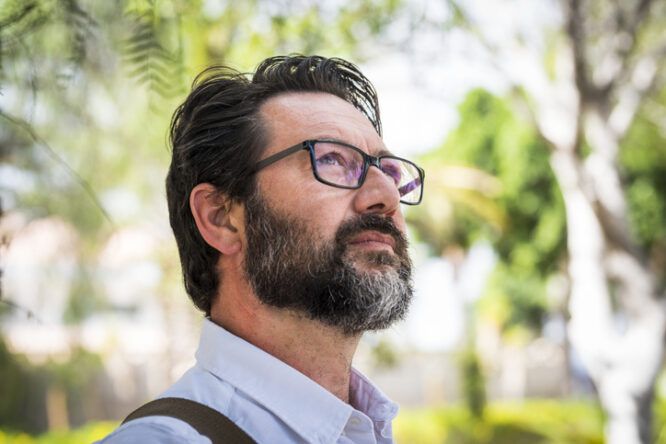Moving on sounds simple in theory, but in practice, it can feel like trying to unstick yourself from emotional superglue.

Whether it’s a relationship, a version of yourself, or a time in life when things just felt easier, holding onto ancient history can be subtle and hard to recognise. Maybe you’ve still got little habits, old patterns, or thoughts you tell yourself are harmless. However, if you’re feeling stuck and can’t figure out why, it might be because part of you is still looking backwards. Here’s how that tends to show up, and what it really means underneath.
1. You romanticise an old chapter that wasn’t actually good for you.

You remember the highlights, the warm moments, the way things felt—before they didn’t. Plus, you conveniently forget the red flags, the stress, or the version of you who cried through most of it. It’s not your fault. The brain tends to gloss over pain and preserve the comfort. However, if you keep polishing a past that hurt you, you stop yourself from stepping into something better.
2. You keep replaying “what if” scenarios that never happened.

You lie awake thinking about what you could’ve said. What you should’ve done. You run mental replays like you’re trying to edit a film that’s already been released. That rumination isn’t closure—it’s distraction. It gives you the illusion of control in a story that’s already over. Every time you go back, you delay your own healing in the present.
3. You haven’t let go of old guilt.

You still beat yourself up for mistakes you made years ago. You’ve grown, changed, and apologised, but something in you still believes you don’t deserve to move forward until you’ve paid for it forever. That belief becomes a cage. And it keeps you from recognising that guilt is meant to teach you, not torture you. If you’ve learned, you’re allowed to move on. You’re not meant to carry it forever.
4. You stay connected to people who only represent your past.

You keep certain friendships or relationships around—not because they still nourish you, but because they remind you of who you used to be. Even if they’re draining now, they feel familiar. That nostalgia can keep you stuck in dynamics you’ve long outgrown. You don’t need to keep shrinking yourself to fit someone’s old memory of you. You’re allowed to outgrow people, too.
5. You feel like your best days are behind you.

You talk about “back then” with a kind of aching fondness. Maybe it was your twenties, a past relationship, a job you left. You remember that version of life like it was your peak. However, if you believe nothing ahead of you can match what’s already been, you’ll stop chasing anything at all. The truth is that there are things you haven’t experienced yet that will shift everything. Of course, you won’t see them if you’re only looking backwards.
6. You still define yourself by a role you no longer play.

Maybe you were “the strong one,” “the achiever,” or “the fixer.” Now that life looks different, you’re not sure who you are without that role. So you keep trying to wear it, even if it no longer fits. However, identity isn’t something you’re meant to lock in forever. You’re allowed to evolve. Letting go of who you were isn’t failure—it’s freedom to become something new.
7. You keep old habits that don’t match your current life.

You do things out of routine, not relevance. You chase validation the same way you used to in that old relationship. You overwork because that’s what got you praise 10 years ago. It doesn’t feel good anymore, but it’s familiar. When you operate from past survival strategies, you keep living in an emotional time warp. Growth means asking: does this still serve me, or am I just used to it?
8. You can’t tell your story without sounding stuck in it.

You talk about your past like it’s still happening. “I was that person.” “I can’t trust because of them.” Your story hasn’t been updated. It’s still rooted in the chapter that broke you. Healing doesn’t mean pretending it didn’t happen. But it does mean rewriting the ending. If the old narrative is the only one you can tell, it might be time to write the next one.
9. You avoid new opportunities out of fear they won’t measure up.

Every time something new appears—a job, a connection, a path—you subtly compare it to what you lost. And if it doesn’t feel the same, you convince yourself it’s not worth it. However, new things won’t feel like old ones. That’s kind of the point. Different doesn’t mean worse, and chasing the past isn’t the same as building a future.
10. You feel resentment toward people who moved on faster than you.

They’re not villains. But their ability to move on feels like a punch to the gut. You see their new job, new partner, new joy, and wonder how they let go so easily when you still feel stuck. That resentment is often grief in disguise. It’s okay to feel it, of course, but staying there won’t help you catch up. Your timeline is your own, and your healing won’t look like theirs.
11. You keep things that keep you emotionally anchored to the past.

Old messages. Gifts. Photos. Playlists. You tell yourself they’re “just things,” but you revisit them like a ritual. That’s not because they make you happy, but because they connect you to who you were with them, or back then. You don’t have to purge everything, but if the item makes you feel smaller, stuck, or sad every time you see it—it might be time to gently let it go. You can keep the lesson without clinging to the reminder.
12. You’re scared to imagine something better because you’re not sure you deserve it.

Deep down, you worry that you already had your chance. That you messed it up. That you missed the moment. So instead of dreaming up a future, you just loop back to the past because it feels safer than hope. However, you’re not behind. You’re not out of chances. Life isn’t linear, and you’re not on a clock. The moment you decide to stop clinging is the moment things can start unfolding again—for real this time.




